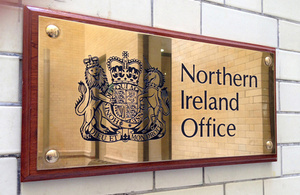Romsey Flood Alleviation Scheme, which will better protect 127 properties, was officially unveiled today (Friday 8 July) by Caroline Nokes MP for Romsey and Southampton North.
The scheme that became operational in autumn 2021, reduces flooding from the River Test and surface water. Costing approximately £9.5 million to build, of which the Environment Agency contributed approximately £6.4 million through government grant in aid.
Romsey has a history of flooding in the 1960s, 1995, 2000 and 2001. In the winter of 2013/2014, water overtopped Fishlake Stream and the Barge Canal, badly flooding 36 homes and 44 commercial properties with devastating consequences for families and businesses.
Simon Moody, Area Director, Environment Agency, said:
The climate emergency is bringing greater risks. We’re seeing more extreme weather, with an increase in flooding. Our response must be to protect our communities as best we can, make them more resilient, and to tackle both the causes and consequences of climate change. We can make a difference if we all work together, like we have done on this scheme.
The flood alleviation scheme includes a tilting weir structure used to control the flows of Fishlake Stream and earth embankments to contain the excess water within a flood plain. At the Causeway, more earth embankments have been built to manage flood water as well as a new bridge and a spillway to enable the flood plain to drain into the River Test.
The risk of surface water flooding has been reduced by improvements to the existing drainage system including ditches, pipes and road drainage at Mainstone junction and Middlebridge Street.
As well as reducing flooding, there are additional ecological benefits from the scheme. Some 150 metres of new water vole habitat have been created and 150 metres of river environment have been enhanced by managing vegetation and improving the structure that controls water flow in the Barge Canal. The London plane trees, some of the oldest in the country, were also carefully preserved during construction.
Members of the local community were consulted throughout the scheme’s development to ensure they were happy with the design. As a result, the new bridge on the Causeway is a Dutch, carbon-friendly design made of glass-reinforced plastic and is covered in timber to blend in with the picturesque surroundings.
The scheme, which took 3.5 years to build, has been developed through partnership working with Hampshire County Council and Test Valley Borough Council.
Councillor Edward Heron, Executive Lead Member for Transport and Environment Strategy at Hampshire County Council, said:
This is an important scheme and we have been delighted to play our part in helping protect residents in Romsey. We contributed £1.5 million towards the total cost and worked in partnership with the Environment Agency, the Borough Council and other local stakeholders on the planning, design and construction of the scheme.
While there will always be a risk of flooding, thanks to the work that has been completed, residents’ properties, businesses, roads and other infrastructure are now much better protected and more resilient.
In addition to building and maintaining flood defences the Environment Agency also runs a free flood warning service. You can sign up for free flood warnings in minutes on gov.uk at Check for flooding – GOV.UK (www.gov.uk) or call Floodline free on 0345 988 1188.
The scheme was funded from flood and coastal erosion risk management grant in aid (£6.4 million), local levy from the Southern Regional Flood and Coastal Committee (£1.2 million), Hampshire County Council contribution (£1.5 million), Test Valley Borough Council contribution (£0.3 million) and EU funding (£0.1 million).
Photos of the flooding, the scheme and its opening are available on request.
In the 2020 Budget the Government doubled its investment in flood and coastal erosion risk management in England by committing a record £5.2bn in 2021-27. This long-term commitment will better protect hundreds of thousands of properties, including homes, businesses, schools and hospitals from the risk of flooding.
